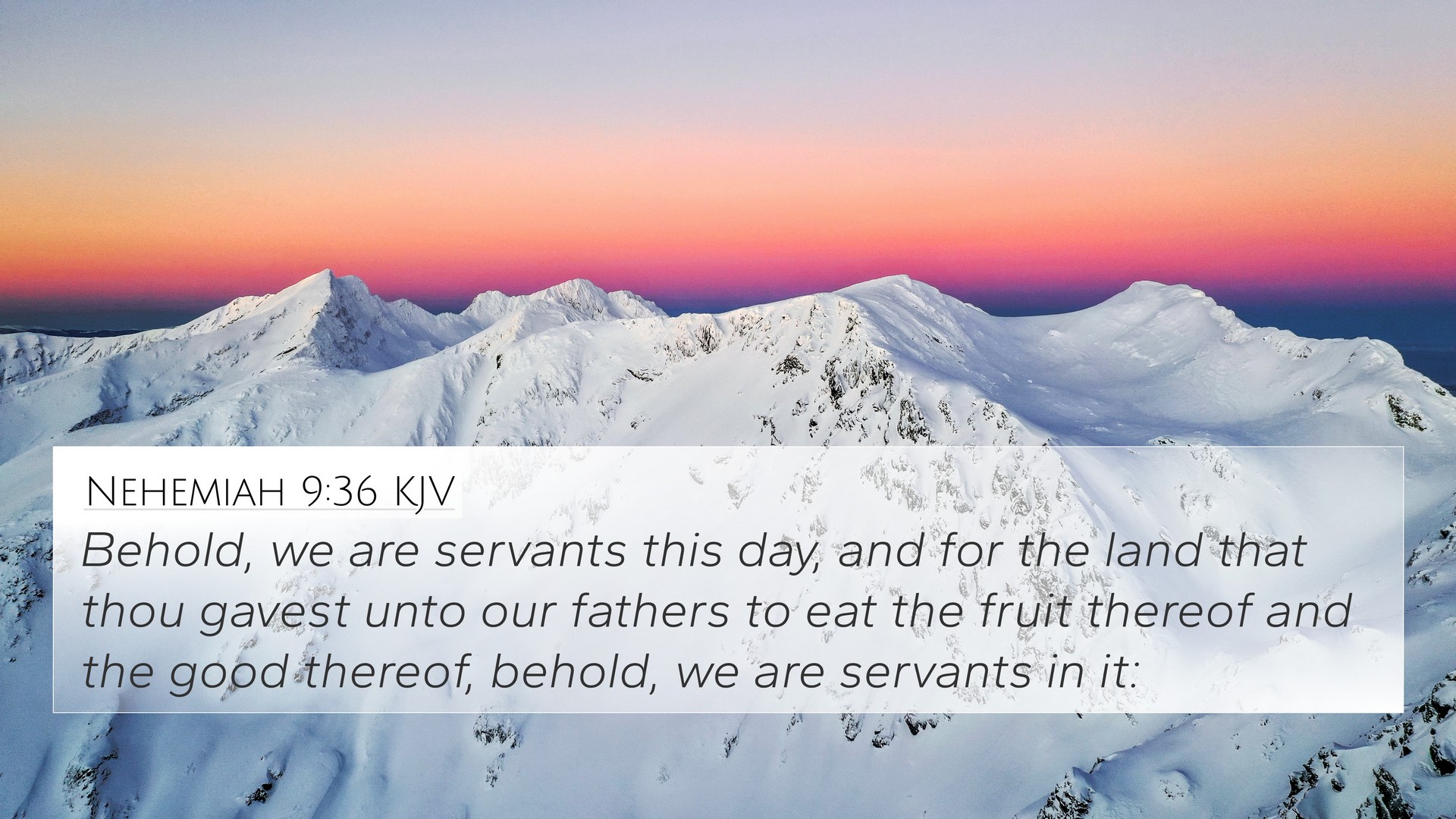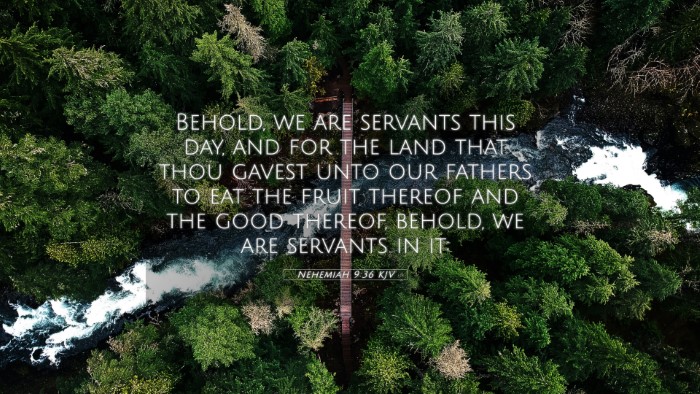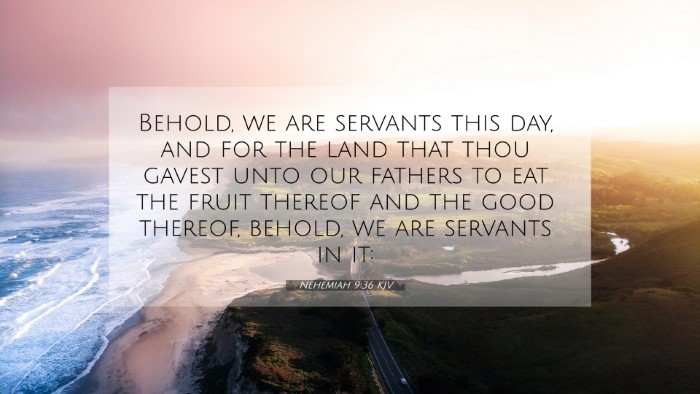Understanding Nehemiah 9:36
Nehemiah 9:36 reads: "Behold, we are servants this day, and for the land that thou gavest unto our fathers to eat the fruit thereof and the good thereof, behold, we are servants in it." This verse encapsulates a profound declaration of servitude and acknowledgment of God's provision.
Summary of Insights
This verse occurs in a prayer made by the people of Israel, reflecting on their history and relationship with God. They recognize their current circumstances and the consequences of their actions. The commentaries provide rich insights into the meaning of this verse:
- Matthew Henry: Henry emphasizes the concept of servitude in this verse. He suggests that acknowledging themselves as servants reflects their understanding of their dependence on God. The people are aware that they've returned to the land under God’s mercy and are now tasked with being faithful stewards of what God has given them.
- Albert Barnes: Barnes notes that this acknowledgment of servitude reveals the people's humility and recognition of their previous sinfulness. Their current status as servants is both a consequence of their past sins and a call to worship, indicating a desire to serve God faithfully in the land He provided.
- Adam Clarke: Clarke points out that this servitude is contrasted with the promise of freedom that comes from faithfulness to God. The people reflect on their lives and the blessings they are still able to enjoy despite their failings. Their prayer signifies a longing for restoration and guidance.
Expanded Interpretation
The people of Israel, after returning from exile, are recognizing both their status as servants and their privilege in possessing the land provided by God. This duality captures themes of humility and stewardship, which are central to their identity as God’s chosen people.
Thematic Connections
Nehemiah 9:36 resonates with numerous themes within the Scriptures. Here are some significant thematic parallels drawn from various biblical texts:
- Exodus 3:10: God calls Moses to bring His people out of servitude in Egypt, emphasizing the nature of God's deliverance.
- Joshua 24:15: "As for me and my house, we will serve the Lord," reinforcing the commitment to serve God alone.
- Romans 12:1: Calls believers to present themselves as living sacrifices, holy and pleasing to God, reflecting our servitude.
- Matthew 20:26-28: Jesus teaches that true greatness comes from serving others, aligning with the servitude theme in Nehemiah.
- Philippians 2:7: Jesus Himself took on the nature of a servant, demonstrating that servitude is the way to achieve divine purpose.
- 1 Peter 2:16: "Live as free people, but do not use your freedom as a cover-up for evil; live as God's slaves," paralleling the idea of serving in freedom.
- Galatians 5:13: Exhorts believers to serve one another humbly in love, tying back to the principle found in Nehemiah's prayer.
- Hebrews 13:17: Encourages following the guidance of leaders in the faith, which echoes the communal aspect of serving God together.
- Mark 10:45: Jesus came to serve and give His life as a ransom, further illustrating the ultimate sacrifice for servitude.
- Deuteronomy 10:12-13: Illustrates the call to fear the Lord, walk in His ways, and serve Him with all their heart and soul, paralleling the sentiments in Nehemiah.
Cross-Referencing Biblical Themes
Nehemiah 9:36 also serves as a focal point for exploring the connections between various Bible verses. Understanding these verses allows for a comprehensive comparative Bible verse analysis:
Tools for Bible Cross-Referencing
Using tools for cross-referencing can enhance one's study of the Scriptures:
- Utilizing a Bible concordance can help locate themes and connections throughout the Bible.
- A Bible cross-reference guide assists in identifying similar verses that address similar topics, enriching the understanding of Nehemiah's emphasis on servitude.
- Cross-reference Bible study promotes the thematic exploration of servitude, faithfulness, and God’s providence as seen in Nehemiah 9:36.
- Learning how to use Bible cross-references can provide clarity on complicated themes, enhancing Scripture interpretation.
- The Bible cross-reference system allows one to see correlations between narratives and teachings across different books.
- Employing cross-referencing Bible study methods can deepen one’s understanding of the coherence of Biblical themes.
- Utilizing Bible reference resources enables a richer exploration of the themes of servitude and stewardship.
- Bible chain references facilitate a journey through interconnected themes, reflecting the breadth of Biblical literature.
- Access to comprehensive Bible cross-reference materials can bolster one's theological studies.
Finding Cross-References in the Bible
To find cross-references related to Nehemiah 9:36, consider the following approaches:
- Identify key themes such as servitude, divine provision, and repentance.
- Explore connections between the Old Testament books and the New Testament teachings that expound on servitude.
- Conduct detailed studies that isolate different passages focusing on servanthood and their implications for believers today.
- Use a cross-referenced study Bible that provides notes on connections between verses for richer understanding.
- Engage with study groups focused on cross-referenced themes in the Bible to discuss insights and understanding.
Interpreting Biblical Themes through Cross-References
Interpreting themes through cross-references allows for a more nuanced understanding of scripture:
Identifying connections between Old and New Testament texts provides a fuller picture of Biblical revelation, exemplified in the themes of servitude from Nehemiah to the teachings of Jesus in the Gospels.
By utilizing these Bible cross-references for sermon preparation, pastors and teachers can develop rich teachings that reflect the depth and continuity of God's word.
In our exploration of Nehemiah 9:36, we see the synthesis of historical acknowledgment of servitude and a hopeful expectation of God’s mercy, underscoring the lasting significance of this verse in the scriptural narrative.





